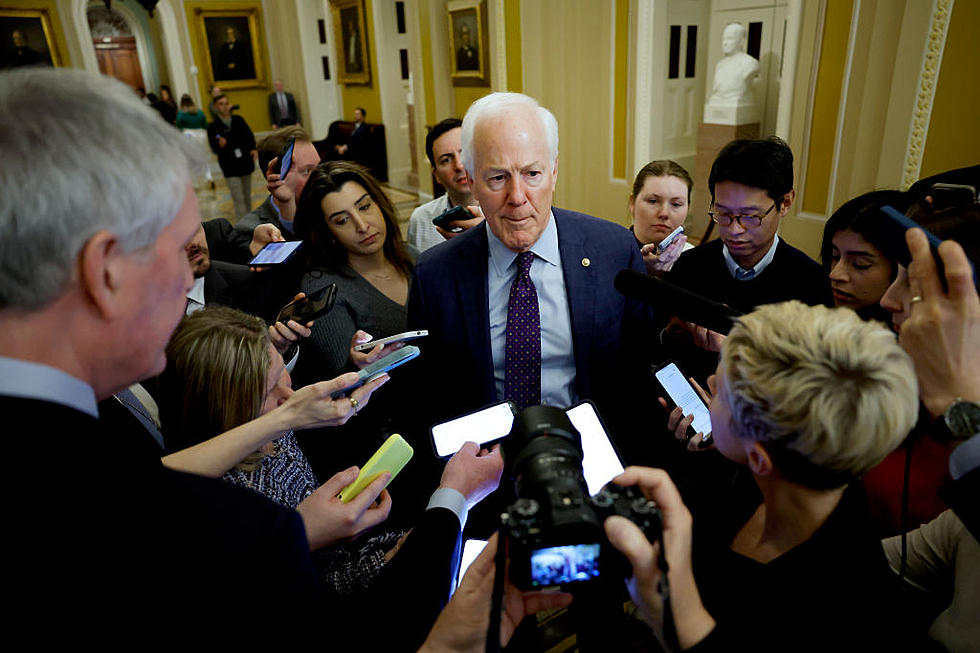
Chad’s Morning Brief: Ted Cruz Backs John Cornyn into a Corner on the Debt Ceiling, Gay Marriage in Texas, and Other Top Stories
Here is your Morning Brief for the morning of February 13, 2014. Give me your feedback below and tune in to The Chad Hasty Show for these and many more topics from 8:30 to 11am. Remember, you can listen online at KFYO.com or on your iPhone/Android with the radioPup App.
Vote Hits Cornyn and McConnell
Senator Ted Cruz demanded that the Senate approve the debt ceiling increase with a 60 vote threshold instead of 51 votes. That move backed Senator John Cornyn and Senator Mitch McConnell into a corner according to POLITICO.
Sen. Ted Cruz and the GOP rank and file ultimately backed Senate Minority Leader Mitch McConnell and Minority Whip John Cornyn into a corner on the debt ceiling increase.
The leaders had wanted to allow the toxic measure to pass with just 51 votes so all 45 Republicans could vote against it. But Cruz, the Texas tea party freshman, demanded approval by a 60-vote threshold.
So McConnell and Cornyn tried to persuade more than five Republicans in safe seats to support the effort, but they were met with stiff resistance. No Republican wanted to be vote No. 60 to advance a bill to raise the debt ceiling without spending cuts, forcing the GOP leaders to secure a comfortable margin of victory or risk being blamed for a historic debt default.
Miffed that they have long been asked to take tough votes when the GOP leaders voted ‘no,’ Sens. Susan Collins of Maine and Lisa Murkowski, privately pressured McConnell and Cornyn to vote to break the filibuster, sources said. Murkowski resisted voting for the measure without the support of her leadership team.
As the drama grew in the chamber with the vote’s prospects in doubt, McConnell turned to his colleagues and said: “We’re not doing this again,” according to a source familiar with his remarks.
So McConnell and Cornyn — both facing reelection this year and battling tea party-inspired challengers in their states — took the plunge and risked the political backlash by voting to break a filibuster, the type of vote the two wily leaders have long sought to avoid in this election season.
After hoping the measure passed without their fingerprints, McConnell and Cornyn were forced to own part of it by allowing it to move to a final vote with their consent, even persuading several of their colleagues to switch their votes. The leaders later voted against final passage. But McConnell decided not to block the measure because he concluded it wasn’t worth repeating yet another crisis-like atmosphere similar to the government shutdown last fall.
The end result: 12 Republicans voted to break a filibuster, advancing the measure on a 67-31 vote. On a party-line vote, the Senate passed the bill, 55-43, sending it to President Barack Obama’s desk and ending three years of partisan brinkmanship and economic crises over debts and deficits.
The last-minute scramble shows just how rapidly debt politics have turned on the Republican Party. After winning big in the 2010 elections, a conservative House majority and emboldened Senate minority vowed to extract major concessions from the White House to raise the national debt ceiling and keep government agencies funded. The consequences of those demands, however, continually fell short of tea-party expectations and ultimately culminated in the 16-day government shutdown in October, a political black eye for the GOP.
“I must say that it was a very courageous act, especially Sen. McConnell, who — as you well know — is in a very tough race,” said Sen. John McCain (R-Ariz.), who voted to advance the measure after initially saying he would oppose it.
Eager to avoid another crisis after the GOP-led House barely passed the clean debt ceiling increase Tuesday evening, Senate Republican leaders wanted a drama-free Wednesday.
But the vote proved to be anything but quick and easy.
The 45-member Senate GOP Conference met over lunch behind closed doors in the Senate’s ornate Mansfield Room, debating how to proceed for more than 90 minutes but reaching no consensus.
Starting the vote more than 10 minutes late, the outcome was still unclear after the conference engaged in its first real debate about how to proceed in the aftermath of the House’s decision to pass a “clean” debt ceiling bill Wednesday evening.
That internal debate spilled into open view on the Senate floor. A grim-faced McConnell stood next to the white-haired Cornyn, who quietly discussed a way forward with Murkowski, Collins, Sen. Bob Corker (R-Tenn.) and a handful of other senators. Tension filled the room as the vote was kept open for more than an hour. The clerks were informed not to announce the names of the senators who had voted, allowing the leaders to urge senators to switch their votes.
You can read the rest of the story by clicking on the link above. I think it's safe to say that Team Cornyn isn't too happy with Senator Ted Cruz this morning.
Gay Marriage Ban in Texas Goes to Court
The battle over gay marriage in Texas was heard in the courtroom yesterday with two couples asking a federal judge to overturn Texas' ban. According to the Dallas Morning News, the judge did not rule on the case but did admit that his ruling wouldn't be the final say.
Two same-sex couples, including one from Plano, asked a federal judge Wednesday to stay Texas’ constitutional ban on gay marriage so one can wed and the other can have their out-of-state marriage recognized.
A lawyer for the state said that would be an end run around the will of Texas voters, who in 2005 approved the state constitutional amendment 3-to-1.
U.S. District Judge Orlando Garcia didn’t immediately rule on plaintiffs’ request for a preliminary injunction.
The case is one of three to challenge the Texas ban — and the furthest along. Nationally, similar battles are underway in federal courts in 23 states.
Garcia, an appointee of former President Bill Clinton, acknowledged that his ruling will be far from the final say on the matter.
“Any one of those cases,” he said, ticking off lawsuits in Oklahoma, Utah, Ohio and Virginia, “or a combination thereof will make its way to the Supreme Court,” he said. In June, the justices ruled, 5-4, that married same-sex couples are entitled to federal benefits.
Quoting U.S. District Judge Sam Sparks of Austin, Garcia said: “Ultimately, a group of five people will decide this case, and I’m not one of those five.”
Lawyer Mark Phariss and physician’s assistant Victor Holmes of Plano, who’ve been domestic partners for more than 16 years, brought the suit, along with Austin residents Cleopatra De Leon and Nicole Dimetman. De Leon and Dimetman got married in Massachusetts in 2009. They have a young son.
Their lawyers, Barry Chasnoff and Neel Lane, argued it’s only a matter of time before the Supreme Court strikes down gay-marriage bans in Texas and 32 other states.
The states have violated the 14th Amendment to the U.S. Constitution by denying a privilege — the ability to marry — for reasons mostly of hostility or “animus” toward gay men and lesbians, Chasnoff said.
Pointing to his wife of 43 years in the audience, Chasnoff said marriage confers many financial and emotional blessings.
“What we want is for Vic and Mark, Nicole and Cleo to have the same opportunity in their life that I’ve been fortunate to have,” he said. “It should not be denied in law because of sexual orientation.”
Assistant Texas Solicitor General Mike Murphy said that concern for children, and a belief they’re best brought up by a heterosexual couple, underlie the Texas constitutional amendment defining marriage as between a man and a woman.
Calling the ballot measure an act of prejudice or ill will against gays and lesbians is “an unsupported claim,” he said.
“The purpose of Texas marriage law is not to discriminate against same-sex couples but to promote responsible procreation,” Murphy said.
Plaintiffs’ lawyers Chasnoff and Lane, though, were quick to point out that infertile and elderly heterosexuals marry all the time, with no interest in having children. Also, the two lawyers noted, many same-sex couples bring up youngsters, through adoption and assisted reproduction.
“If marriage is good for children, then it’s irrational to prohibit same-sex couples who could have children from being married,” Lane said.
The U.S. Constitution requires states to give “full faith and credit” to other states’ laws and judicial edicts.
Murphy, who works for Attorney General Greg Abbott, the leading Republican candidate for governor, said the Texas ban doesn’t trample on other states’ decisions.
“An out-of-state marriage is not terminated when they move to Texas,” he said of gay and lesbian couples. “It’s simply not recognized.”
Federal courts haven’t enshrined same-sex marriage as a fundamental right of U.S. citizens, Murphy said. Massachusetts was the first state to legalize same-sex marriage, in 2004, he noted.
“It is a more recent innovation than Facebook,” he said.
Murphy said the plaintiffs want to yank the hot-button social issue from the Legislature and voters and hand it to federal judges.
“This court should not do that,” he said.
The argument irritated Phariss, the plaintiff who’s also a lawyer. He told reporters after the hearing that U.S. voters ratified the 14th Amendment, which provides for states to give equal protection of the laws to all citizens, in 1868.
“The U.S. Constitution trumps anything that Texas does,” he said. “What stings is that they use a local action here to try to suggest that that would somehow or another trump our constitutional rights.”
Other Top Stories:
These and many more topics coming up on today’s edition of The Chad Hasty Show. Tune in mornings 8:30-11am on News/Talk 790 KFYO, streaming online at kfyo.com, and now on your iPhone and Android device with the radioPup App. All guest interviews can be heard online in our podcast section after the show at kfyo.com.
More From News/Talk 95.1 & 790 KFYO









